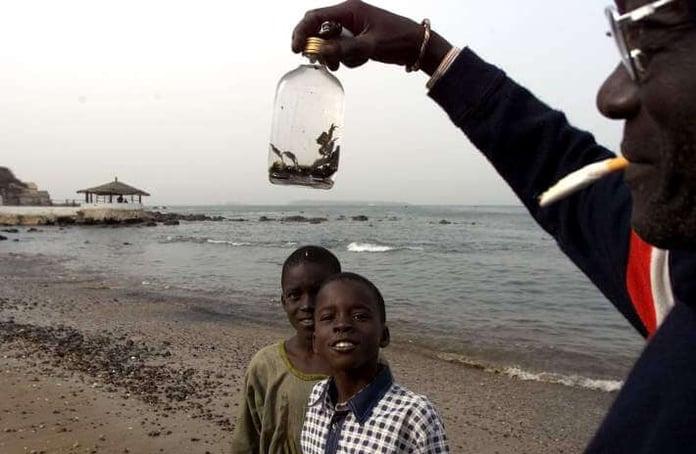In contrast to other African countries, Senegal has so far been restricted to a curfew at night. But even that is tough for many residents. Passes have become a sought-after commodity, and the rich have their own tricks to bypass the rules.
There has been a curfew at night in Senegal since March 23. This is a relatively mild measure compared to the total one Lockdown in South Africa, in Rwanda and the two Nigerian cities of Lagos and Abuja. But even a curfew that is limited to the night can become an existential threat for many poor people, who sell their goods on the roadside in the evening, for example. In Kenya, which also resorted to such a measure, the violent clashes between the police and the residents of the Kibera slum in the capital, Nairobi, testify to this. In Congo-Kinshasa, there is the saying “Si tu ne sors pas, tu ne manges pas” (“If you don’t go out there is nothing to eat”), which is now heard in variations in many countries.
Back to the country
As in other African countries, many Senegalese from the city try to go back to their relatives in the country. Because many have no more earnings since the restaurants and numerous shops are closed, people only drive buses and taxis when necessary, and now the beaches have also been closed, which is also a sales market for all the flying traders with their belly shutters. Many townspeople still have parents or relatives in the village, with a small field and a few animals. “If we no longer earn anything in Dakar, we can go back just as well to where we came from,” they say to themselves. There they have fewer expenses and at least eat. Travel between regions is prohibited, but there are always hidden paths.
A night watchman in Dakar wanted to visit his wife and children in the country again. A colleague of his had a laissez-passer and had him driven to the nearest town for the equivalent of ten francs, which is about an hour away from Dakar. As to how the colleague got his pass, the guard says: “He knows someone in the state.” Because there were no longer any taxis, he had to walk the seven kilometers from the city to his family, together with the big sack of rice that he had brought with him because there was a supply bottleneck in the village. The coveted passes, which you can get free of charge if you are entitled to purchase them, are now traded on the black market for the equivalent of up to CHF 500.
The police hired as a chauffeur
The last few days have dominated Dakar High society’s death the headlines. A group of young people organized a party in the middle of the curfew and rented an apartment for one night in the noble district of Almadies. The matter would hardly have been exposed if one of the participants had not died from a drug overdose. Her colleagues panicked took Reissau and simply left them there. The police research revealed that the woman had joined the group at ten at night. To get around the curfew, she’d paid the equivalent of thirty francs to a policeman and he drove her there. Had he said no, he probably would have saved her life. The case is evidence for many Senegalese people who suffer from the curfew that the rich are above the law. They are convinced that those involved will get away with it.
In the beginning, Covid-19 had a reputation as an “elite disease” in several African countries because it primarily affected people who had come from Europe. Perhaps there was certain mischief in this finding because even infected members of the government, who otherwise flew to Paris or London in the event of illness, had to be treated in the local hospitals. But there was also fear of the possibly infected foreigners. An acquaintance was in a village in a remote province and was about to greet the village chief when he received a phone call and then asked her to leave the village immediately. Perhaps the unrest about the presence of the whites was so great that he thought it would be safer for them to disappear immediately.
After all, more fish again
The number of cases in the Almadies district is above average; for many, it is an indication that the disease still mainly affects “traveling empires”. The high number is probably also because more people can be tested there than in poor neighborhoods. Regardless, the curfew is undoubtedly less drastic for the rich than for day laborers who have to share a tiny apartment with a dozen relatives.
However, the pandemic has a few advantages. The Senegalese fishermen unanimously report that after years of overfishing, the fish stock has now recovered quickly after some of the big Chinese trawlers have left. It’s just a shame that the big catch can’t be exported right now because the planes remain on the ground.


